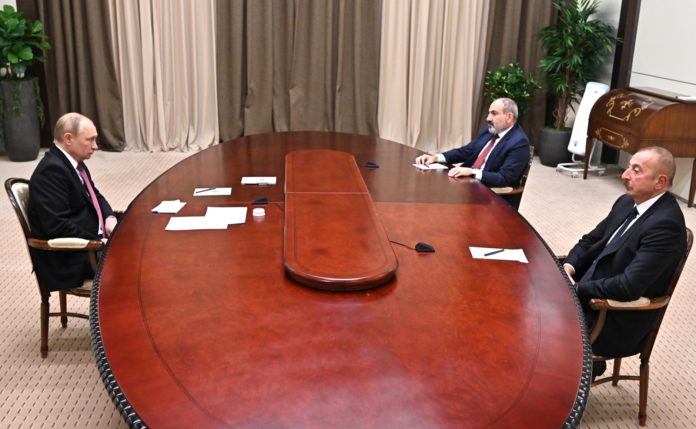By Joshua Kucera
(Eurasianet) – The leaders of Armenia and Azerbaijan have met for the first time in nearly a year, and the second time since they fought a war last year. While they did not sign long-awaited agreements to reduce ongoing tension between the two countries, they did formally promise to form a bilateral commission to delimit and demarcate their mutual border.
Azerbaijan President Ilham Aliyev and Armenian Prime Minister Nikol Pashinyan met, along with Russian President Vladimir Putin, in Sochi on November 26. The three had plenty to discuss, as several issues continue to divide the two countries a little more than a year after the war: ongoing border tension, plans to open up borders and transportation links, and Armenian prisoners of war still being held in Azerbaijan.
Putin met first with Aliyev one-on-one, then Pashinyan joined them, then Putin met Pashinyan without Aliyev. The public part of the trilateral meeting took place, as had the first one, with Putin on one side of the table and the two Caucasus leaders on the other side, barely acknowledging one another.
In spite of sharply rising tension between the two sides, including heavy fighting less than two weeks earlier, Putin chose to accentuate the positive that has been accomplished since he brokered a ceasefire on November 9, 2020. He highlighted the fact that 53,000 [Armenian] refugees have returned to their homes following the fighting; that the 2,000-strong Russian peacekeeping contingent now stationed in Nagorno-Karabakh is working “with high marks from both sides,” and that “large-scale military activities have not taken place.”
Both Pashinyan and Aliyev heaped praise on the Russian peacekeeping mission, despite discontent with the peacekeepers from both sides. Armenians resent their failure to stop Azerbaijan from continuing to lay on pressure, and from Azerbaijan for the fact that they are in effect preventing them from completing takeover of the rest of their territory. (Notably, while Azerbaijani officials including Aliyev regularly describe the Russian presence as “temporary,” Aliyev didn’t use that word to Putin’s face. “We hope that next year that work [of the Russian peacekeepers] will be continued and there will be more good results,” he said in his one-on-one with Putin.










